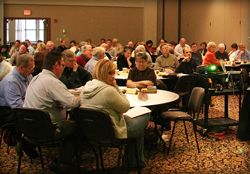Six Strategies for Handling Conflict in Your Marriage
When my husband and I got engaged, we breezed through our pre-marriage days in perfect harmony. Besides a few lighthearted skirmishes, due in part to the difficulties of navigating a long-distance relationship, we got along like two birds of a feather. It was easy to think it would always be that way.
But, far from naive about the struggles of marriage, I did what any self-respecting English major would do and read all the books I could find on how to have the best marriage ever. All my reading left me fairly confident that my husband and I could avoid a lot of the typical pitfalls with the proper strategies in place.
But just like many of the stories of old, pride did indeed goeth before the fall. Our first year of marriage coincided with our first jobs, first pregnancy, and first real taste of adulthood. The sharp winds of reality and my own flaws quickly bowled over my unrealistic expectations about a conflict-free marriage.
Caralee Frederic, certified therapist for the Gottman Institute and licensed clinical social worker, says that striving to avoid disagreements should not necessarily be the goal. “We aren’t aiming for the perfect marriage,” Frederic explains. “Even stable couples have arguments.” According to Frederic and the research at the Gottman Institute, the most important indicator of marital happiness lies in how a couple handles disagreements and how they repair after a fight. “How often and how well a couple repairs their relationship is a big indicator of the long-term health of the marriage,” Frederic says.
Sometimes you’re both tired, and you get a bit snappy with each other. Sometimes you can’t figure out how to balance both your families during the holidays. No life, no marriage, and no person is perfect. The struggle is real. And more importantly, the struggle is normal. But that doesn’t mean you can’t use a few strategies to help navigate conflicts in a productive way.
01. Fight fair.
Rather than trying to create a conflict-free marriage, my husband and I focus on improving how we disagree and argue (or even fight) while also working on apologizing, compromising, and moving on. “The Gottman Institute warns couples to avoid the ‘four horsemen of the relationship apocalypse’: criticism, contempt, defensiveness, and stonewalling,” Frederic explains. It’s important to vent anger and frustration constructively without falling into the trap of these relationship breakers.
Our efforts to fight fair are now also motivated by our desire to be a good example to our kids. We want our kids to know that our love for each other (and for them!) is unconditional. This is our marriage in action, and I hope our kids will learn from watching our struggle to resolve conflict in a loving and healthy way.
02. If at first you don’t succeed . . . apologize quickly.
Sometimes we can’t help our initial reaction, and we snap, but we can always smooth things over in our second reaction. Pride and defensiveness can cause us to give an excuse for our behavior rather than just apologizing first.
My husband and I learned that two ivory towers do not a happy marriage make. “I’m sorry” is oftentimes a more powerful phrase than “I love you” when repairing your relationship.
03. Table it.
Time-outs aren’t just for kids. In my own marriage, we have discovered that if you can’t talk civilly about a subject, don’t. Go for a run, watch a funny show, or wait until the morning to discuss an issue that needs a resolution.
Honestly, I think that tabling a conversation is one of the hardest things to do, but it pays to schedule a difficult discussion for a later time. Your marriage will forego a lot of heartache if you can hold off until everyone’s had their coffee or a glass of wine to hash out an issue.
04. Externalize the problem.
When my husband and I hit a point of frustration, we try to articulate the frustration with care. Don’t let your partner feel that he or she is the problem; instead phrase your concern as if you are both outside the problem working together. Frederic points out that “each person sees the same set of facts with their own unique point of view that is valid.” Frederic encourages couples to “externalize the problem.”
Instead of making emotionally charged and critical statements such as “You always forget to take out the trash,” try to identify the issue, and say, “The trash wasn’t taken out yesterday. How can we remember this next week?” The former statement puts your spouse on the defensive, and the latter externalizes the problem and opens the dialogue to begin finding a solution with your spouse.
05. Make ‘I’—not ‘you’—statements.
This one takes forethought, but for us it means the difference between an unproductive fight and a constructive conversation. Perhaps this seems like a minor detail, but this small change when airing a frustration can make all the difference in how your spouse reacts.
Gottman’s research shows that complain without blame is the antidote to criticism. Rather than accuse with statements such as “You really frustrate me with your mess,” turn the statement on its head, and begin with a more personal approach: “I feel frustrated when the house is a mess.” Again, the “I” statement invites dialogue, whereas the “you” statement would incite blame and criticism. Criticism can eat away at a marriage, but compassion strengthens the bond by softening the heart.
06. Break the touch barrier.
“Physical touch is a powerful tool in a relationship,” Frederic explains. “But you have to be smart about when you use it.” Thanks to the bonding hormone oxytocin, which is produced by physical affection, touch helps foster intimacy in a relationship. Holding hands or sitting close while discussing a problem can help ease tension during an argument for some couples.
In one of my favorite romantic comedies, Hitch, Alex Hitchens advises one of his mentees, Albert Brennaman, on how to break the touch barrier with a woman he loves in a non-sleazy way—that is, using small gestures of physical touch to increase intimacy. While others might need to cool off before reconnecting, it’s important to break that touch barrier at some point when a couple has experienced conflict to avoid stonewalling and coldness in a relationship.
True love in a marriage—and in any relationship, for that matter—means loving each other through the imperfections, disagreements, and challenges, no matter what. We can’t be surprised or discouraged by the inevitable tensions that arise in our daily lives, but just as a good coach never shows up to the game without a playbook, couples should have a few strategies in place to help resolve and repair those conflicts swiftly and compassionately.

